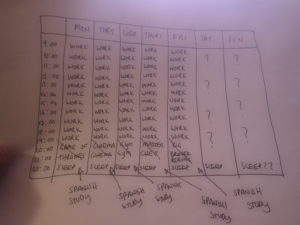In this second part of the series on how to approach the Spanish language (check out the previous entry!) we are going to tackle the issue of making a study plan! “What?” you say… “Making a study program is easy! Motivation is the hard part!” We’ll address the issue of motivation later, but contrary to many peoples’ beliefs, making a study program is not as easy as it sounds. A lot of people have not studied since high school, and there are those of us who never did much of it anyway! Further to these impediments, is the fact that studying is a skill, and the methods involved are varied and not easily imparted. While we don’t purport to have all the answers to a fail proof study program, we hope to give you some tips. With a lot of practise and determination, you will no doubt get the hang of it, find your own groove and the rhythm, and work out what works best for you.
The following is a sample (although you could make unlimited variations on these themes) of how to go about getting good at Spanish. While there is merit in learning in a chaotic environment (randomly searching for grammatical topics online, pouring over books and other materials, reading whatever you can get your hands on, heading down to the pub for a language exchange with some friends or fellow language-learners etc.), a chaotic approach suits someone who is already motivated and who understands how to study. If you’re completely lost, like a lot of people, it’s best to create a regimented plan and stick to it – at least for a while. No time? Everyone has time. The question is: “are you willing to allocate time to this?” If the answer is “yes”, then your timetable might look something like this:
Ok, that was a joke. Hopefully no one’s timetable looks like that, and that is clearly an exaggeration, but you will probably have to make a couple of sacrifices if your schedule is already pretty busy. Let’s say you want to study five days per week. Each session might be an hour long, so there are five hours in total, not including any lessons you may be taking. This is not supposed to be a minimum or maximum recommendation. Only you will know how you respond to study, although an hour a week is unlikely to be enough. Give yourself a few months of the following (see next blog entry) and watch how good you get (provided you stick with it)!
Next up, a rundown of the actual sessions that you could incorporate into your study plan for Spanish!
Share this article!

